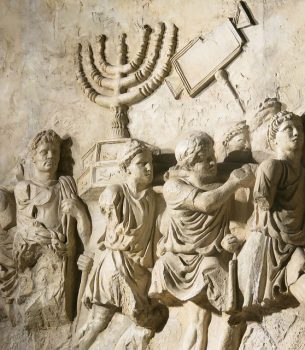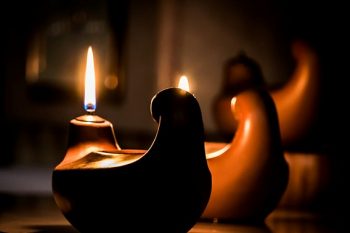The Story of Hanukkah Posted by Ayana on Dec 11, 2017 in Uncategorized
During the Hellenistic period (323 BC–31 BC), Greek culture spread throughout the vast empire. The Greek arts, literature, architecture, music, mathematics, and science prevailed in the states under the regime of the Greeks. Among them was the Kingdom of Judah, and the Jews living in Judah were inspired as well by the Greek culture. They adopted Greek names, translated the Tora to Greek, admired the ideal Greek human form, sculpted Greek sculptures and discussed Greek philosophy. But they didn’t neglect Judaism; they kept the commandments and worshipped their God. The polytheist Hellenistic rulers provided freedom of religion to their citizens, letting their subjects observe their customs and beliefs.
An exception was Anthiochus IV, who issued an edict at 167 BCE forbidding the practice of Judaism. Regular sacrifices were suspended, together with observance of the Sabbath and the traditional feasts. Copies of the law were ordered destroyed, and the circumcision of children forbidden. Disobedience in any of these things carried the death penalty. Pagan altars were erected throughout the land, and Jews were forced to participate in idolatrous rites. To crown it all, in December 167 BC, the cult of Olympian Zeus was introduced into the Temple, and an altar to Zeus was set up inside the Temple of Jerusalem.
The priest Matityahu ben Yoḥanan served in the Temple in Jerusalem. In 167 BCE, when asked by a Seleucid Greek government representative (belongs to the Seleucid Empire who followed the division of the Macedonian empire) to offer sacrifice to the Greek gods, he not only refused to do so, but also killed the Jew who had stepped forward to do so and the government official that required the act. Upon the edict for his arrest, he took refuge in the wilderness of Judea with his five sons and called upon all Jews to follow him. Many eventually responded to his call, willing to fight with him against the horrible persecution of Judaism.
They weren’t many, but together they organized a guerilla army in the hills. The Maccabean Revolt against the Seleucid Empire and the Hellenistic influence on the state of Judah lasted from 167 to 160 BCE. After the death of Matityahu, his oldest son Judah Maccabee took over the leadership of the revolt. The well trained and equipped Greek army outnumber the Jewish dilettante army. But maybe that was their advantage: they were quick, mobile and used guerilla tactic against slow and bulky army. After seven years of battles, the Maccabean Revolt ended with the victory of the Maccabees.
The Maccabees entered Jerusalem in triumph and reestablished traditional Jewish worship. On the 25th of Kislev month, they purified the Temple and rededicated it. They tried to light the menorah, but the victorious Maccabees could only find a small tin of oil, and although it only contained enough oil to sustain the Menorah for one day, it miraculously lasted for eight days, by which time further oil could be procured. The festival of Hanukkah commemorated the miracle of the oil, because the lights of Hanukkah symbolize the spiritual victory of Jewish values over the enemy.
The rededication of the Temple did not end the fight, however. Many more battles were fought before the conflict finally ended. It was not until 142 BCE that the Greeks finally signed a peace treaty with Simon, the last survivor of the five sons of Mattathias. But every year at the 25th of Kislev month we celebrate the victory of the Maccabees, the inner spiritual strength that has enabled the Jewish people to outlast the greatest empires in history. The light of Hanukkah is symbolic of the inner spiritual strength of the Jewish people that despite all odds is never extinguished.
Text vocabulary
Empire (feminine) = אִימְפֶּרְיָה
Empires = אׅימְפֶּרְיוֺת
The Greek Empire = הָאִימְפֶּרְיָה הַיְּוָנִית
The Persian Empire = הָאִימְפֶּרְיָה הַפַּרְסִית
Period (feminine) = תְּקוּפָה
Hellenistic period = הַתְּקוּפָה הַהֶלֶנִיסְטִית
Culture (feminine) = תַּרְבּוּת
Greek culture = תַּרְבּוּת יְוָנִית
Judaism (feminine) = יַהֲדוּת
Religion (feminine) = דָּת
Freedom of religion = חֹופֶשׁ דָּת
Idolatry = עֲבוֹדַת אֱלִילִים
Temple (masculine) = מִקְדָּשׁ
Revolt (masculine) = מֶרֶד
The Maccabean Revolt = מֶרֶד הַמַכַּבִּים
Also called מֶרֶד הַחַשְׁמוֺנָאׅים
Miracle (masculine) = נֵס
The miracle of the oil = נֵס פַּח הַשֶׁמֶן
Hanukkah = חֲנוּכָּה
Related posts:
It’s Not Hanukkah Without Sufganyiah
Keep Calm and Eat Latkes

Build vocabulary, practice pronunciation, and more with Transparent Language Online. Available anytime, anywhere, on any device.





